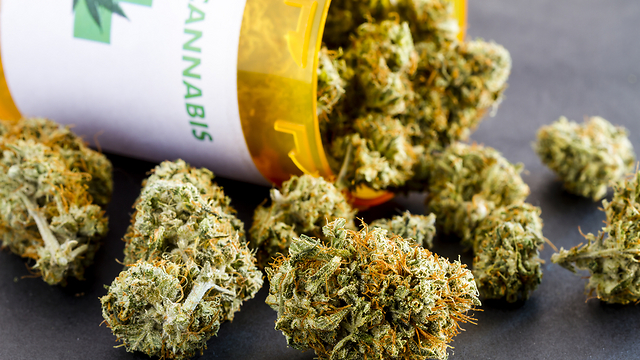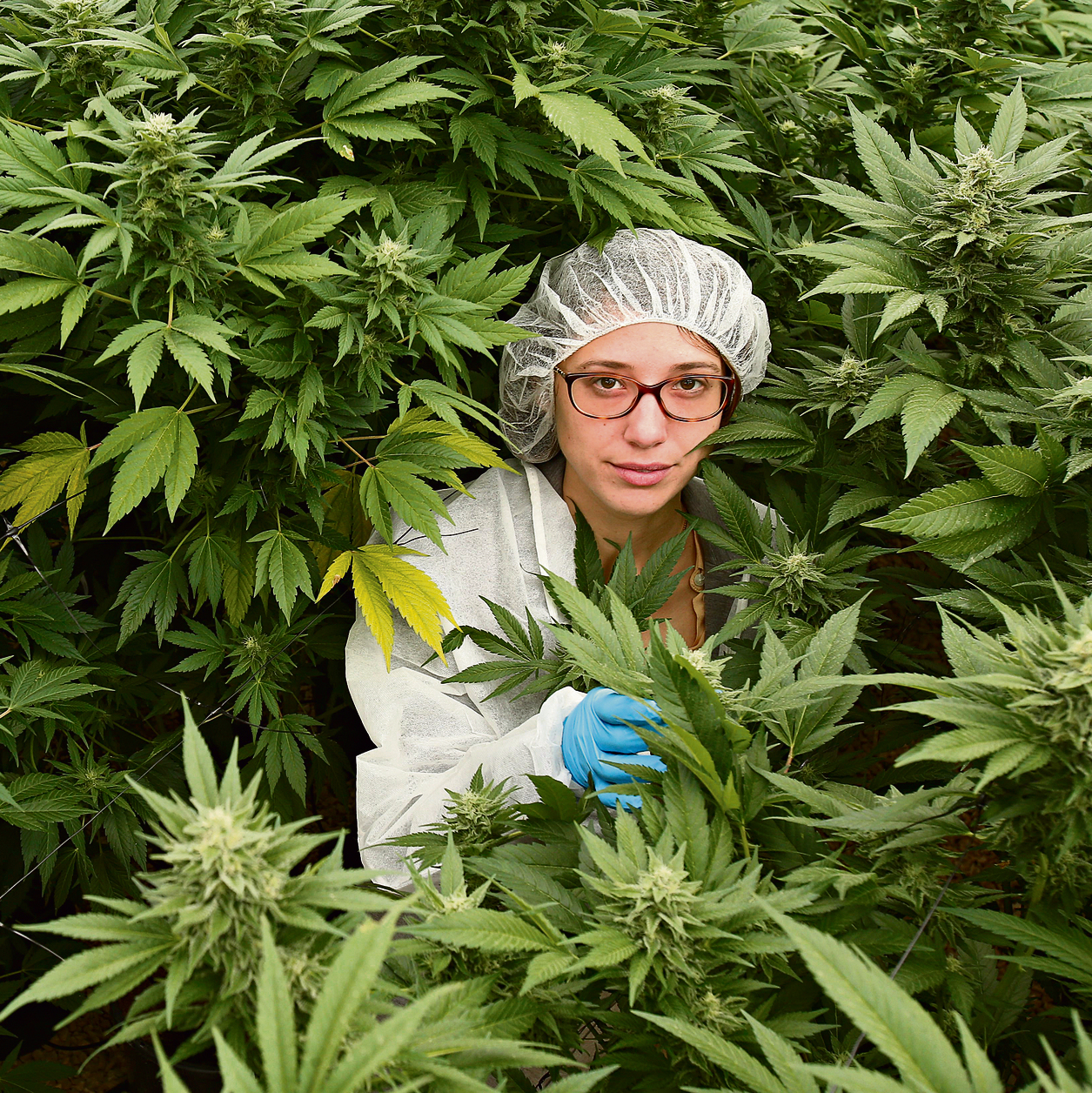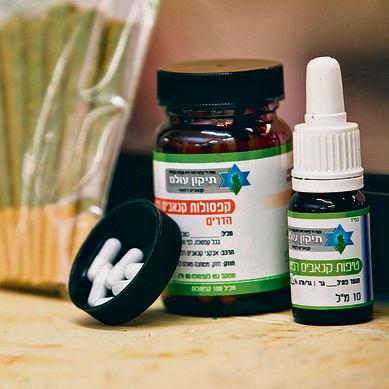
Israel set to become major exporter of medical cannabis
Inter-ministerial committee recently recommended the export of cannabis abroad; Public Security Minister Erdan opposes the committee's recommendations, warning that the country is unprepared to handle the ramifications of the export of this 'dangerous drug.'
Israel will soon become a major exporter of medical cannabis and be one of the only nations in the world to officially export the plant to countries that approved it for medicinal use, all the while marijuana remains an illegal, controlled substance in Israel.
According to estimates, revenues from the export of Israeli cannabis could reach about NIS 1 billion a year.
A government committee appointed to examine the issue by Finance Minister Moshe Kahlon and Health Minister Yaakov Litzman has recently recommended to approve the export of medical cannabis.
Ministers Kahlon and Lizman made it clear in advance they intend to adopt the recommendations of the committee, which was headed by Finance Ministry Director-General Shai Babad and Health Ministry Director-General Moshe Bar Siman Tov.
Minister of Public Security Gilad Erdan, meanwhile, said Tuesday he is against exporting cannabis from Israel.
In a letter to Kahlon and Litzman, Erdan wrote he was "surprised" to see reports of the inter-ministerial committee's recommendation to allow exports under government supervision.
He expressedreservations about the economic gain from the cannabis market and asserted it does not justify "the damages that could be caused by Israel waving the flag of cannabis export."
Erdan also noted the timetables proposed by the Ministries of Finance and Health are unrealistic in regards to police preparations to issue export permits, adding "there is a great problem in promoting exports, certainly at this time, before examining the implications and finalizing the regulation of medical cannabis in Israel."

He then insisted the police will have to significantly increase its drug enforcement activities, including expanding the inspection system for workers and owners of cannabis greenhouses, increasing enforcement systems for local and international supervision, developing means for remote detection of illegal greenhouses, supervising the burning of confiscated cannabis, secured transportation to laboratories throughout the country, and an increase in the legal system's allotments for attorneys in drug cases.
He went on to argue it would be "irresponsible, unprofessional and unwise" to do so as long as the regulations are not finalized for growing the plant in a more limited capacity for the immediate needs of patients in Israel.
Erdan claimed promoting the export of cannabis abroad requires more strict and meticulous regulation. He noted that an examination of the cannabis markets in the Netherlands, Germany, the United States, the United Kingdom, Canada, Italy and France shows most countries do not export medical cannabis, and those that do, do so under government supervision.
"As long as Israel wants to break through and lead in the field of medical cannabis export, it must first prove to itself and to the world it is making every effort to crack down on illegal use of cannabis and to disseminate information to the public about the dangers of the drug," Erdan concluded.
Legal advisor to the Ministry of Public Security, Yoel Hadar, also wrote that expanding the cannabis market beyond domestic consumption will lead to the drug also making its way into the black market, which will help organized criminal groups take control of the cannabis market and reach young people and teenagers.
Another point the ministry made is that "there is concern patients who require cannabis for medicinal purposes will be affected because of the preference for exporting cannabis abroad over local supplies. At the same time, there is also concern the quality of local produce marketed in Israel will suffer compared with that directed abroad."
However, Finance Ministry Director-General Babad claimed Israel is already one of the most advanced countries in the world in the field of research and development of medical cannabis.
"There is already a market operating in the country (for medical cannabis) and more than 30,000 patients consume it," Babad said in an interview with Ynet. "The committee recommended the export of medical cannabis that was approved by the Ministry of Health, and there are quite a few countries that have already contacted us."
Is it possible for an Israeli living in, for example, Los Angeles to receive the drug faster than one living in Israel, who even has difficulty obtaining a permit?
"Regulation of medical cannabis in Israel is something new that began last year following government decisions on the issue. There are already more than 70 licensed physicians and, in time, more doctors will join, and I suppose (obtaining a permit) will be easier.
"Our concern is of leaks of medical products into non-medical markets, and that greenhouses that grow the medical products will not meet the high standards required. We will demand the highest standards in order to reach a high-quality medical product that we will allow to export."
The special inter-ministerial team was established by virtue of a government decision in June 2016. In addition to the director-generals of the Ministries of Finance and Health, the committee included representatives from the Ministries of Agriculture and Rural Development, Public Security, Justice and Economy.
The committee examined the economic, legal and regulatory aspects of exporting medical cannabis and concluded there is nothing to prevent Israel from being one of the only countries in the world where cannabis can not only be grown for medicinal purposes, but also permitted by law to be exported to other countries.
The committee's position is that there is significant economic potential for cannabis export to the international market, and Israel has many advantages for export, including the most advanced R&D in the field, clinical experience and a hospitable climate that can be exploited by farmers, researchers and entrepreneurs to produce Israeli medical cannabis products.
"The export of quality medical-standard products entails the possibility of establishing a global standard on the matter, ensuring the safety and effectiveness of its use, and increasing the ability to control and monitor the cannabis products that will be exported," the committee noted.
Therefore, the committee recommended the government to allow the export of cannabis products from local growers who will meet the quality standards set by it for growth, production, storage, distribution and supply chain security.
The team also recommended that the government allows exports by the growers themselves, under the strict supervision of the state, as is the practice in the export of controlled narcotics such as painkillers.
The team determined that anyone who meets all the requirements can obtain a license to grow, manufacture, store and/or distribute medical cannabis, even in large quantities.
This could make cannabis exports one of Israel's leading export industries within a few years, including smoking products, oils, tablets and evaporation-based products.
The team thoroughly examined the export potential of medical cannabis and reviewed the situation in other Western countries.
In addition, representatives of the Israel Police and the Anti-Drug Authority, as well as commercial companies, licensed cannabis growers, and entrepreneurs interested in growing cannabis, appeared before the committee to discuss the export potential of medical cannabis and the benefits it could bring to the economy.
In recent years, medical cannabis use has increased in many countries around the world, including Israel. At the same time, there has been progress in scientific research in the field leading to the clinical establishment of the cannabis plant as one containing compounds with medicinal effects beneficial to a variety of symptoms and diseases.
Israel currently has eight licensed growers in various areas, from the Aravah region in the south to Israel's north. To date, more than 500 entrepreneurs have submitted applications for growing cannabis, which are currently being examined.
Since the price of medical cannabis worldwide is estimated at about $10 per gram, the value of exports from Israel today at world prices stands at NIS 600 million a year. As more growers enter the market, a senior source told Yedioth Ahronoth that within a year or two the value of exports is expected to reach NIS 1 billion.
There is already a keen interest today from many countries to import medical cannabis from Israel. Australia, Germany, Denmark, the Czech Republic and Cyprus have already applied for it.
The market size of medical cannabis just in the countries that expressed interest in importing medical cannabis from Israel is between NIS 1 and 4 billion a year.
The committee stated that "In view of the general trend in the industry, it is expected that additional countries will potentially be interested in Israeli exports."
The committee determined the Israel Police and the Ministry of Health must prepare—within a maximum of three months from the date of the committee's recommendations adopted by the government—for the export of medical cannabis from Israel.














